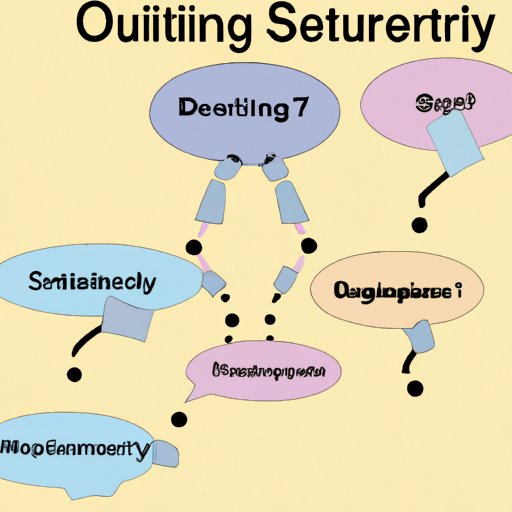Introduction
Inquiry is a fundamental part of the scientific process. But what does inquiry mean in science? This article will explore the meaning of inquiry in science and its role in scientific discovery and learning. We’ll look at how inquiry drives scientific research and how it helps us better understand our world. We’ll also discuss the role of inquiry in scientific learning, including how it can help students develop critical thinking skills.

Exploring the Meaning of Inquiry in Science
Inquiry is the act of seeking information or knowledge. In science, inquiry involves exploring the natural world to find answers to questions about how things work and why they happen. To do this, scientists must use creative problem-solving and critical thinking skills.
Defining Inquiry
According to the National Research Council, “Inquiry is the central process through which scientists and students alike develop explanations of the natural world.” Inquiry is an active process of exploration and investigation that involves gathering evidence, making observations, and analyzing data to build understanding. It is a dynamic process of questioning, hypothesizing, testing, and revising ideas.
Inquiry as a Process
Inquiry is a cyclical process of posing questions, collecting data, analyzing evidence, and drawing conclusions. Scientists use this process to make sense of the natural world. As they ask questions and seek answers, they refine their understanding of the topic and develop new theories and hypotheses.
Inquiry-Driven Learning
Inquiry-driven learning is an educational approach that encourages students to explore topics in depth and develop their own questions, hypotheses, and experiments. By engaging in this type of learning, students gain a deeper understanding of the subject matter and become more confident in their ability to use scientific methods to solve problems.
How Inquiry Drives Scientific Discovery
Inquiry plays a key role in scientific discovery. Through inquiry, scientists are able to explore new questions and uncover new knowledge about our world.
The Role of Questions
Questions are the starting point for inquiry. Scientists begin by asking questions about a particular phenomenon or issue. These questions can range from broad and open-ended to highly specific. Once a question has been identified, scientists then use the scientific method to find answers.
Finding Solutions Through Experimentation
Experimentation is an essential part of inquiry. Through experimentation, scientists are able to test ideas and gather evidence to support or refute theories. By conducting experiments, scientists are able to draw conclusions about the natural world.
Connecting Theory to Practice
Inquiry allows scientists to connect theoretical knowledge with practical applications. By asking questions, experimenting, and analyzing data, scientists are able to develop new technologies and treatments that have the potential to improve people’s lives.

Using Inquiry to Understand Our World
Inquiry also helps us better understand our world. Through inquiry, we can explore phenomena, develop hypotheses, and test ideas to gain a deeper understanding of the natural world.
Investigating Phenomena
Inquiry begins with observing and investigating phenomena. Scientists observe the behavior of a particular phenomenon and identify patterns and relationships. They then use this information to develop hypotheses and theories about how the phenomenon works.
Developing Hypotheses
Once a hypothesis has been developed, scientists use experimentation to test it. They collect data and analyze it to determine if the hypothesis is correct. If the data supports the hypothesis, scientists can then form a conclusion about the phenomenon.
Testing Ideas and Formulating Conclusions
The final step of inquiry is to formulate a conclusion. Scientists use the data they have gathered to draw conclusions about the phenomenon they have been studying. This helps them gain a better understanding of the natural world.

The Role of Inquiry in Scientific Learning
Inquiry is also an important part of scientific learning. By engaging in inquiry-based learning, students can develop a deeper understanding of scientific concepts and develop critical thinking skills.
Understanding the Scientific Method
Inquiry-based learning helps students understand and apply the scientific method. Students learn how to pose questions, develop hypotheses, conduct experiments, and draw conclusions. Through inquiry-based learning, students gain a better understanding of the scientific process and how to use it to solve problems.
Applying Problem-Solving Strategies
Inquiry-based learning also helps students develop problem-solving strategies. By engaging in inquiry, students learn how to use observation, experimentation, and analysis to find solutions to complex problems. This helps them develop critical thinking skills that can be applied to any situation.
Developing Critical Thinking Skills
Inquiry-based learning encourages students to think critically and evaluate evidence. Students learn how to evaluate data and draw conclusions based on their findings. This helps them develop analytical and problem-solving skills that can be used in all areas of life.
Inquiry-Based Science: A Primer
Inquiry-based science is an approach to teaching science that emphasizes the importance of inquiry. Through inquiry-based science, students learn how to make observations, gather data, and draw conclusions about the natural world.
Making Observations
The first step of inquiry-based science is to make observations. Students observe a phenomenon and identify patterns and relationships. They use this information to develop hypotheses and theories.
Gathering Data
Once a hypothesis has been developed, students need to gather data to test it. This can be done through experimentation or by collecting existing data. Students analyze the data and use it to draw conclusions.
Drawing Conclusions
The final step of inquiry-based science is to draw conclusions. Students use the data they have collected to determine whether the hypothesis is correct. They then use this information to gain a better understanding of the phenomenon.
Conclusion
Inquiry is an essential part of the scientific process. It drives scientific discovery and helps us better understand our world. Inquiry also plays an important role in scientific learning, helping students develop critical thinking skills and understand the scientific method. Inquiry-based science is an approach to teaching science that emphasizes the importance of inquiry and helps students gain a deeper understanding of the natural world.
In summary, inquiry is an integral part of science. Through inquiry, scientists are able to explore new questions and uncover new knowledge about our world. Inquiry-based learning also helps students develop problem-solving and critical thinking skills. By engaging in inquiry, we can gain a better understanding of our world and develop solutions that have the potential to improve people’s lives.
(Note: Is this article not meeting your expectations? Do you have knowledge or insights to share? Unlock new opportunities and expand your reach by joining our authors team. Click Registration to join us and share your expertise with our readers.)
